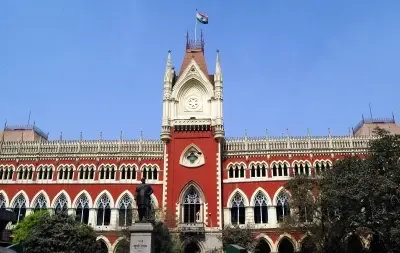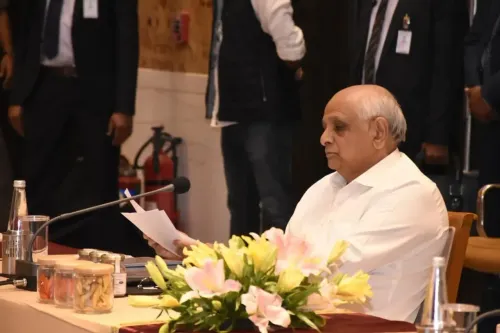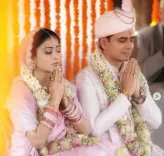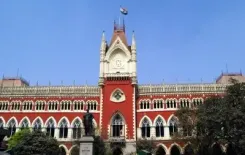Did Former CJI Gavai Address the Khajuraho Controversy Correctly?
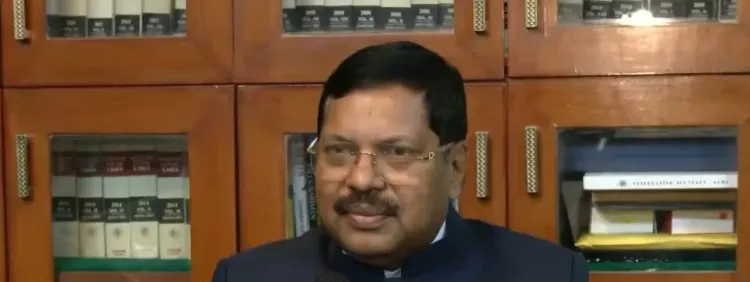
Synopsis
Key Takeaways
- Justice Gavai's remarks were misrepresented on social media.
- He emphasized the jurisdiction of ASI over temple alterations.
- Criticism of judges should be constructive, not personal.
- The misuse of technology poses challenges for the judiciary.
- Legal regulation of online platforms is necessary.
New Delhi, Nov 27 (NationPress) Former Chief Justice of India (CJI) B.R. Gavai spoke on Thursday regarding the uproar linked to his statements in the Khajuraho temple matter, asserting that social media often portrays remarks “out of context.”
This discussion stems from a September incident in which former CJI Gavai encountered backlash for comments deemed insensitive during a hearing concerning a plea for the restoration of a damaged idol of Lord Vishnu in Madhya Pradesh.
In dismissing the petition, the Bench, under then CJI Gavai, indicated that the matter was within the jurisdiction of the Archaeological Survey of India (ASI). During the proceedings, he allegedly advised the petitioner to “pray to Lord Vishnu” if he had faith in divine intervention, which incited anger among certain advocates and social media users.
The petition aimed to obtain directions for the repair of a 7-foot damaged idol of Lord Vishnu located at the Javari Temple within the Khajuraho complex, a recognized UNESCO World Heritage Site. This controversy escalated to a significant event inside the Supreme Court, where a 71-year-old lawyer reportedly threw a shoe at Justice Gavai. The individual was permitted to leave without charges following instructions from the former CJI to the Registrar General.
In an exclusive interview with IANS, Justice Gavai clarified his previous statements, asserting, “Generally on social media, things are said out of context. It was circulated that I said this or that, but it was completely misrepresented.”
He further noted, “I only stated that temples under the ASI cannot be altered without ASI approval. The court cannot interfere in such matters. I have made the same observation in Waqf cases as well. The law permits only religious practice, not structural changes unless authorized by ASI. Whatever was circulated online was unjustified.”
When questioned about the appropriateness of judicial criticism, the former CJI remarked that judgment critique is vital in a democracy, yet personal attacks are unacceptable.
“Criticism of judgments is always welcome. A judgment may be right or wrong, as judges are also human. But trolling or personally targeting judges is not justified,” he stated.
On the growing misuse of technology and online platforms, he commented, “Everyone is facing the nuisance of social media — whether it’s the Executive, Judiciary, or Legislature. Technology is a boon, but it is being misused. Artificial Intelligence, too, is being misused.”
He stressed the necessity for legal regulation, adding, “Parliament should prioritize enacting a law to control this menace. Technology has advantages, but also serious disadvantages. Proper regulation is needed.”
Justice B.R. Gavai, the 52nd Chief Justice of India, has had a lengthy legal career. He began his legal practice in 1985 and was acquainted with the rule of law early in life, having grown up in a family involved in social activism. Throughout his career—as an advocate, judge of the Bombay High Court, Supreme Court judge, and finally as CJI—Justice Gavai displayed a profound commitment to judicial efficiency and the rule of law. His decisions have sparked discussions both in courtrooms and on digital platforms, significantly contributing to Indian jurisprudence.
Justice Gavai was sworn in as the 52nd CJI on May 14, succeeding Justice Sanjiv Khanna. His name was recommended by Justice Khanna on April 16 and approved by the Law Ministry on April 29. His appointment marked a historic milestone as he was the first Buddhist and only the second Chief Justice from the Scheduled Caste community after Justice K.G. Balakrishnan to hold the post.


